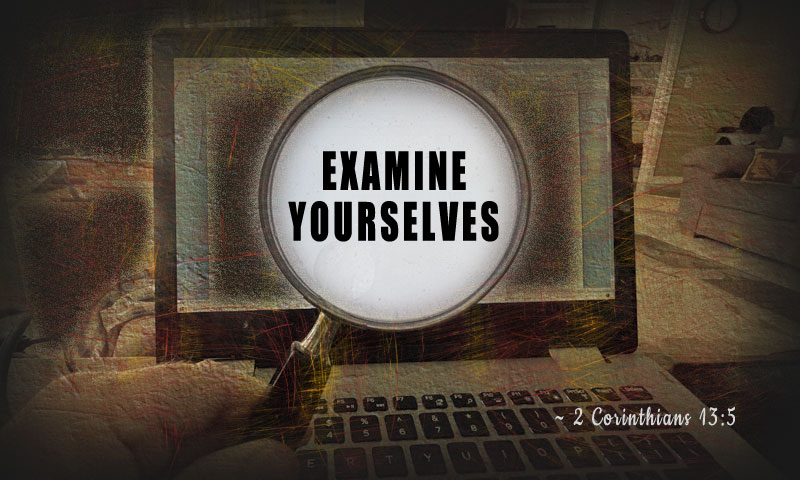
Examine yourselves, whether ye be in the faith; prove your own selves. Know ye not your own selves, how that Jesus Christ is in you, except ye be reprobates?
~ 2 Corinthians 13:5
Paul urges each of his readers to examine whether their own relationship with God is real. It is not good enough if other people consider us to be genuine Christians. Even our own heart (mind) can convince us of something that is not true*. So we must be extremely careful in this matter.
A person’s life should show evidence of whether that person truly has a relationship with God*. That evidence appears both in the person’s attitudes and his actions*. A true Christian should have faith* – that is, he should trust God. Also, he should show love, both for God and for other people*. He should do what God wants him to do*. He should listen to God’s word, the Bible, and obey it. He should choose to do what is right, and not to do wrong and evil acts.
However, a person may be a genuine Christian even when his relationship with God is weak. Such a person may show very little evidence of his relationship with God. That person should try hard to make that relationship stronger; then the evidence will be stronger, too. He can pray; he can study the Bible; he can get help from other Christians. He must try to obey God in every circumstance; he should try to serve God whenever there is an opportunity.
If any person truly is a Christian, then Jesus Christ is living in that person. Paul did not consider that to be a theory or a word-picture, but an actual reality. God, whose home is higher than the heavens, has entered that person’s life. There God remains; therefore, the person has become God’s home also*.
That relationship is possible only because of Christ’s death. He died so that God can forgive our evil deeds. That relationship begins when we turn from our evil deeds to invite Christ into our lives*.
That relationship begins in this life, and it will never end*.
From: usefulbible.com – by Keith Simons
What does the Bible say about self-examination?
Self-examination is an important part of living as an authentic Christian, but by nature we prefer self-deception. Deceiving ourselves is easy and comfortable. We want to believe ourselves better, smarter, and more ethical than we really are, so careful, Spirit-directed self-examination keeps us honest with ourselves and with God.
Read what else gotquestions.org says on this subject – click here
Are you a Christian? Many people who claim to be point to some event in the past to substantiate their claim. But inviting Jesus to come into your life in the past is not proof that you are genuinely saved. In 2 Corinthians 13:5 Paul says to the Corinthian church, “ Examine yourselves, whether you are in the faith; prove yourselves (emphasis added).” He wouldn’t have said that if some event in the past were obviously the answer. The Bible never verifies anyone’s salvation by the past but by the present. If there is no evidence of salvation in your life now, you need to face the fact that you may not be a Christian. You need to examine yourself to see whether you are in the faith. How does one do that? Jesus shows us in the Sermon on the Mount (Matthew 5-7).
What a disaster it would be to come before Christ on Judgment Day and discover you are sentenced to hell because you didn’t come to Him His way! Examine yourself to see whether you are in the faith. As Peter said, “Be all the more diligent to make certain about His calling and choosing you”
Click Here to continue reading the Examine Yourself article – PDF
Examine Yourself by Paul Washer
In this sermon, you will be tested according to the Bible as to whether you are a believer or not. Line by line, he explains how to know if you are in the faith by reading 1 John. Every believer should listen to this sermon. Being deceived is very dangerous to the believer.
Read more at Know the Bible - Click Here
